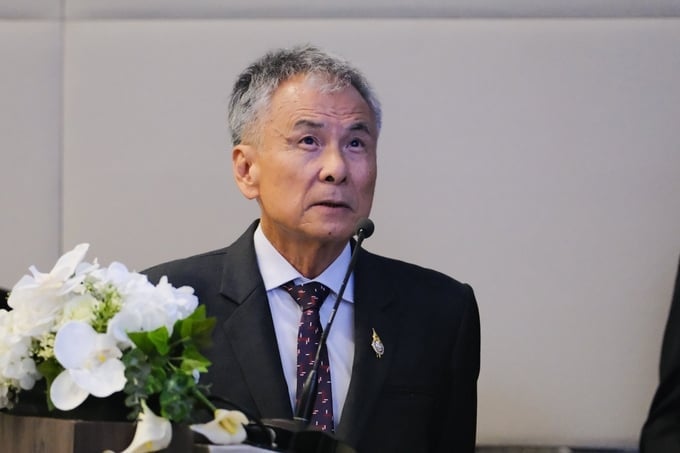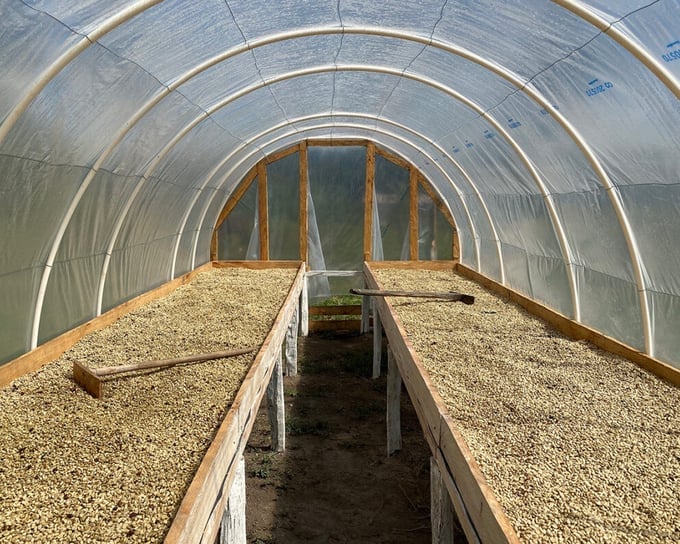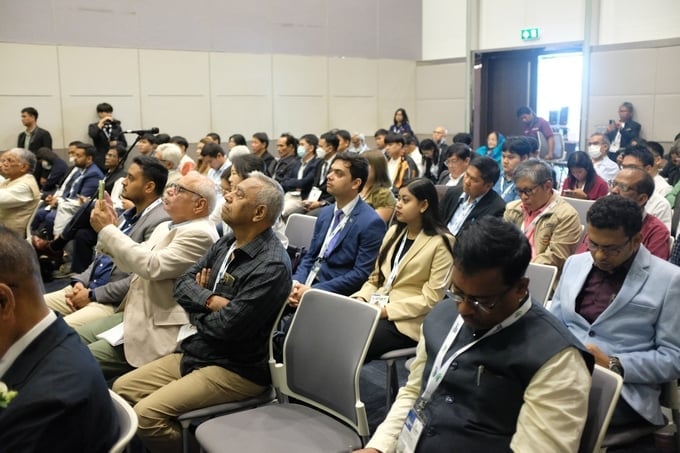November 27, 2025 | 23:48 GMT +7
November 27, 2025 | 23:48 GMT +7
Hotline: 0913.378.918
November 27, 2025 | 23:48 GMT +7
Hotline: 0913.378.918
Within the framework of Agritechnica Asia & Horti Asia 2024, the session on "Smart Agricultural Engineering for Resilient and Sustainable World" was conducted on May 22, where an expert from Thailand shared experiences in agricultural drying research, industry, and guidelines for fighting against greenhouse gas emissions.
Global warming and climate change, driven by greenhouse gas emissions, are widely recognized as critical issues. These emissions contribute to the rise in global temperatures, with predictions indicating an increase of 1.5 to 2 degrees Celsius compared to pre-industrial levels. This temperature rise has far-reaching effects, including sea-level rise, ocean acidification, extreme weather events, ecosystem destruction, and significant health impacts.
As someone deeply involved in agricultural drying research and industries, particularly in Thailand's hot and humid climate, Prof. Somchart Soponronnarit, the King Mongkut’s University of Technology Thonburi can attest to climate change's profound impact on agriculture. This is especially true for key economic crops such as rice, corn, sugarcane, cassava, fruits, and vegetables.
The agricultural drying process, which consumes substantial energy, contributes significantly to greenhouse gas emissions. Therefore, adopting sustainable practices in agricultural drying is crucial for mitigating these emissions and promoting environmental sustainability.
Drying is one of the oldest technologies for preserving agricultural products. Paddy and corn are the most important grains produced in Thailand. The moisture content at harvesting is around 18-25% wet-basis. The products must be dried rapidly enough down to 14 % to prevent them from spoilage. Serious quality problems of paddy are yellowing and broken grain while fungi and aflatoxin are critical in corn, especially in the feed industry.

Prof. Somchart Soponronnarit, the King Mongkut’s University of Technology Thonburi speaking at the panel. Photo: Quynh Chi.
Thailand exports a significant amount of dry hit each year, e.g. pineapple glace, papaya glace, mango glace, etc. Finished products of fruit glace include drying near the end of the processing line.
Meanwhile, the agricultural drying process consumes a significant amount of energy, contributing considerably to greenhouse gas emissions. Implementing sustainable measures is essential to reduce greenhouse gas emissions and combat climate change. These measures include using renewable energy sources, investing in energy-efficient technologies, optimizing drying processes, and minimizing post-harvest losses.

Herbs in a solar drying house. Photo: TL.
To further enhance the sustainability of agricultural drying, global policies like the Carbon Border Adjustment Mechanism (CBAM) play a crucial role. CBAM aims to address carbon leakage and create a level playing field for domestic industries by imposing a carbon price on imported goods based on their carbon footprint. This policy encourages industries worldwide to adopt greener practices, including measures in agriculture. Moreover, global policies such as CBAM can drive international efforts to reduce carbon emissions and promote sustainable agriculture.
For Thailand, a country committed to achieving carbon neutrality by 2050 and net-zero emissions by 2065, these practices and policies are vital. By adopting these measures, Thailand's agricultural sector can enhance its resilience to climate change, improve productivity, and contribute to a sustainable future.
Professor Somchart Soponronnarit asserts that transitioning from fossil fuels to renewable energy sources such as solar energy, biomass, and other renewables is essential. Particularly, solar drying and solar heat pump drying are highly effective and have become more affordable thanks to advancements in solar panel technology, offering a cost-effective alternative to fossil fuels.
Secondly, investing in energy-efficient drying technologies like heat pump drying can significantly reduce energy consumption. Although maintaining these technologies requires expertise, their efficiency far surpasses traditional high-temperature drying methods.
Additionally, the Thai expert suggests that optimizing drying processes through advanced technologies such as sensors, machine learning, and artificial intelligence can further enhance efficiency and reduce energy usage.
To reduce greenhouse gas emissions associated with agricultural drying, several sustainable practices can be implemented. First, shifting from fossil fuels to renewable energy sources such as solar energy, biomass, and other renewables is essential. Solar drying and solar heat pump drying, in particular, are highly effective and now more affordable due to advancements in solar cell technology, providing a cost-effective alternative to fossil fuels.

Experts attending the session on "Smart Agricultural Engineering for Resilient and Sustainable World" was conducted on May 22. Photo: Quynh Chi.
Second, investing in energy-efficient drying technologies like heat pump drying can significantly lower energy consumption. Although maintaining these technologies requires expertise, their efficiency surpasses that of traditional high-temperature drying methods.
Third, optimizing drying processes through advanced technologies such as sensors, machine learning, and artificial intelligence can further enhance efficiency and reduce energy use. Lastly, minimizing post-harvest losses is crucial, as techniques like in-storage paddy drying use considerably less energy (1 to 2 megajoules per kilogram of water evaporated) compared to high-temperature drying (over 4 megajoules per kilogram). These combined practices not only mitigate greenhouse gas emissions but also promote environmental sustainability in agricultural drying.
Drawing from his experience, several drying methods have proven successful in Thailand and other regions. In-storage paddy drying involves using ambient air to dry paddy stored in bulk, making it highly energy-efficient and requiring minimal electricity, which can now be generated cost-effectively using solar cells. This technique is particularly useful as a second-stage drying method after initial high-temperature drying. High-temperature grain drying methods such as fixed bed drying, disaggregating batch drying, and continuous flow drying (including mixed flow and cross-flow dryers) are also employed.
These methods vary in efficiency and applicability depending on the initial moisture content and environmental conditions. Additionally, innovative drying technologies like three-dice bed dryers have been successfully scaled up from prototypes to handle larger capacities, efficiently reducing moisture content and making them suitable for large-scale operations. These successful stories highlight the potential of adopting diverse and innovative drying methods to improve efficiency and sustainability in agricultural practices.
Session on Smart Agriculrural Engineering for Resilient and Sustainable World was co-held by the Thai Society of Agricultural Engineering (TSAE) and the Asian Association of Agricultural Engineering (AAAE), with support from the German Agricultural Society (DLG), aimed to disseminate academic advancements and exchange ideas on various beneficial topics both academically and practically.
According to Ms. Dares Kittiyopas, President of TSAE, the forum serves as a platform for sharing ideas on planning and setting future development goals in agricultural engineering, such as no-burn agriculture and agrifood business development.
Translated by Dieu Linh

(VAN) On November 27, in the meeting with Minister Tran Duc Thang, Mayor Yin Yong shared Beijing’s experience to improve environment and air quality.

(VAN) After 30 years, both sides identified strategic areas of cooperation: sustainable production, increasing coffee value and training for farmers.
/2025/11/27/4910-4-164708_294.jpg)
(VAN) On the afternoon of November 27 in Beijing, Minister of Agriculture and Environment Tran Duc Thang held a working session with several major Chinese enterprises operating in the agriculture and environment sector.

(VAN) The Department of Animal Health issued a provisional guideline requesting local authorities to increase surveillance, collect samples for testing, and conduct epidemiological investigations according to the established procedure.

(VAN) The United Nations recommends that Vietnam utilize data and artificial intelligence to enhance early disaster warnings and reduce GDP losses by 3.2% in the context of climate change.

(VAN) On the morning of November 27 in Beijing, Minister Tran Duc Thang and the Deputy Commissioner General of the General Administration of Customs of China signed a protocol on fresh jackfruit exports.

(VAN) As floodwaters recede, a vast network of irrigation works across eastern Gia Lai is emerging in a state of severe disrepair, with extensive damage demanding urgent restoration ahead of the 2025-2026 winter-spring cropping season.